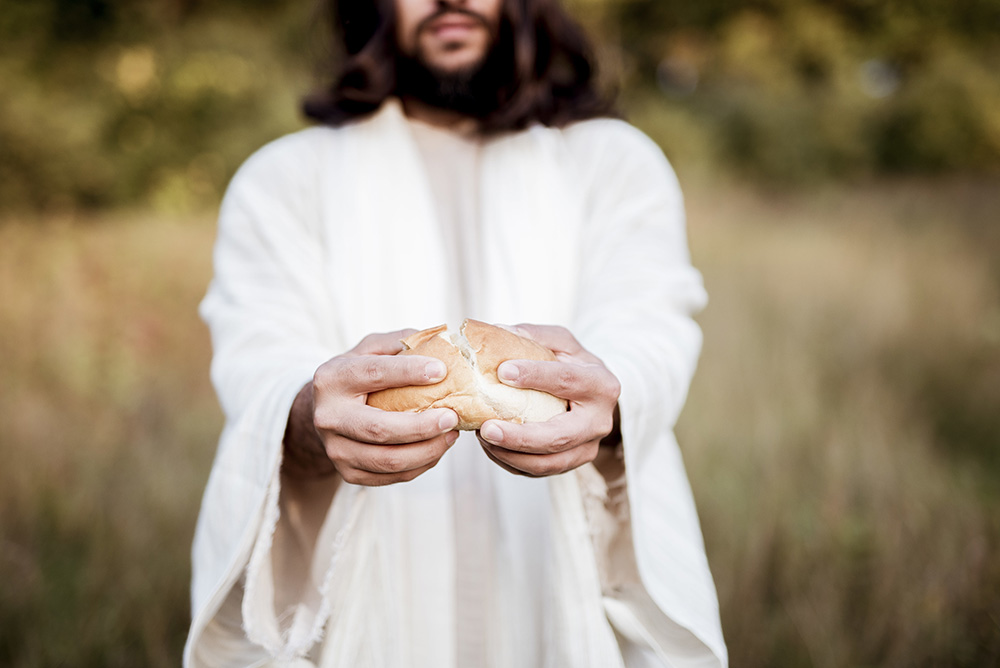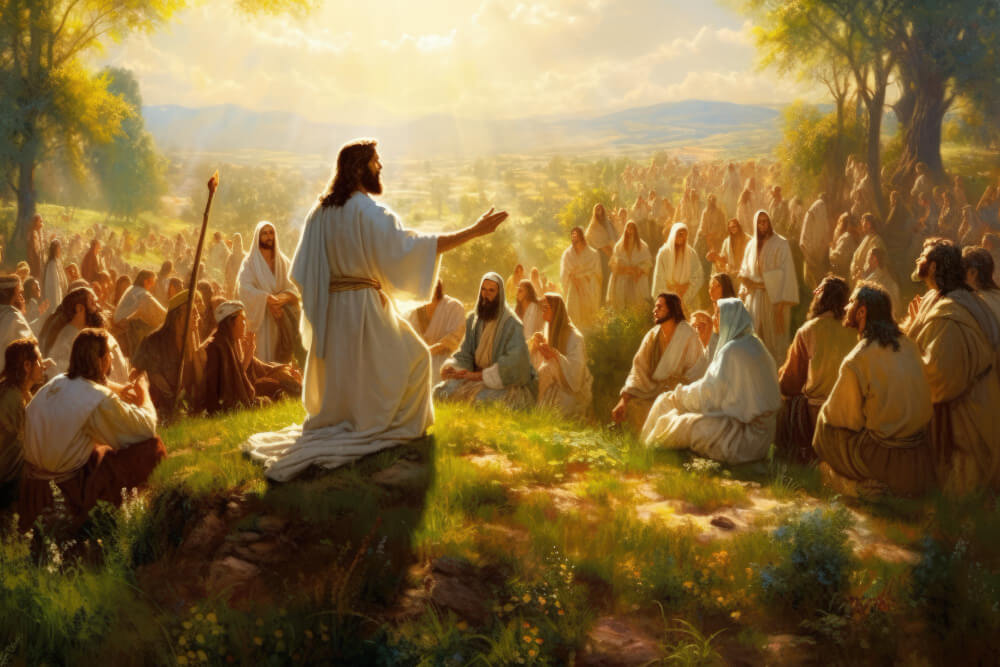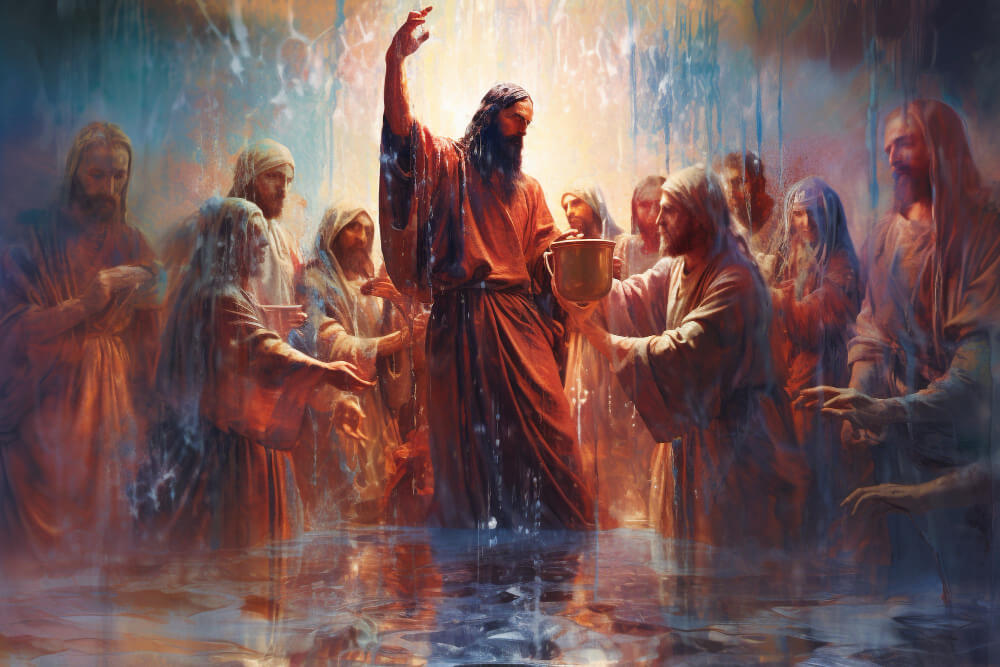The record of the feeding of the five thousand is found in all four gospels, but John gave us a little more detail than the others, from which there is much to learn. Let’s read John 6 v 1-14 together.

6 After these things Jesus went over the Sea of Galilee, which is the Sea of Tiberias. 2 Then a great multitude followed Him, because they saw His signs which He performed on those who were diseased.[a] 3 And Jesus went up on the mountain, and there He sat with His disciples.
4 Now the Passover, a feast of the Jews, was near. 5 Then Jesus lifted up His eyes, and seeing a great multitude coming toward Him, He said to Philip, “Where shall we buy bread, that these may eat?” 6 But this He said to test him, for He Himself knew what He would do.
7 Philip answered Him, “Two hundred denarii worth of bread is not sufficient for them, that every one of them may have a little.”
8 One of His disciples, Andrew, Simon Peter’s brother, said to Him, 9 “There is a lad here who has five barley loaves and two small fish, but what are they among so many?”
 10 Then Jesus said, “Make the people sit down.” Now there was much grass in the place. So the men sat down, in number about five thousand. 11 And Jesus took the loaves, and when He had given thanks He distributed them [b]to the disciples, and the disciples to those sitting down; and likewise of the fish, as much as they wanted. 12 So when they were filled, He said to His disciples, “Gather up the fragments that remain, so that nothing is lost.” 13 Therefore they gathered them up, and filled twelve baskets with the fragments of the five barley loaves which were left over by those who had eaten. 14 Then those men, when they had seen the sign that Jesus did, said, “This is truly the Prophet who is to come into the world.” (NKJV).
10 Then Jesus said, “Make the people sit down.” Now there was much grass in the place. So the men sat down, in number about five thousand. 11 And Jesus took the loaves, and when He had given thanks He distributed them [b]to the disciples, and the disciples to those sitting down; and likewise of the fish, as much as they wanted. 12 So when they were filled, He said to His disciples, “Gather up the fragments that remain, so that nothing is lost.” 13 Therefore they gathered them up, and filled twelve baskets with the fragments of the five barley loaves which were left over by those who had eaten. 14 Then those men, when they had seen the sign that Jesus did, said, “This is truly the Prophet who is to come into the world.” (NKJV).
Jesus looked at the vast crowd of people and had compassion for them, realising that they were far from home or any natural source of food and they must be hungry. He saw the opportunity to test Philip’s faith, but Philip was only thinking in the natural at that point.
Next we meet Andrew. I do wonder if maybe at times Andrew felt less significant than most of the other disciples. He would be so wrong if he thought that and we can learn from what we know of him. We first read about Andrew in John chapter 1, v 40-42 :
40 One of the two who heard John speak, and followed Him, was Andrew, Simon Peter’s brother. 41 He first found his own brother Simon, and said to him, “We have found the [l]Messiah” (which is translated, the Christ). 42 And he brought him to Jesus.
We can do nothing more significant in this life than lead a brother or anyone else to Jesus! Andrew was wonderfully used by God when he introduced Simon Peter to the Messiah, the Lord Jesus Christ.
There should surely be encouragement here for many who feel insignificant in life, indeed in the kingdom of God. Every great evangelist, people like Billy Graham and Reinhard Bonnke, first heard the gospel from somebody. If we knew such people’s testimony in detail, how many were led to Jesus by someone who considered themselves just an ordinary person, of no great significance? If you know Jesus as Saviour and Lord and you tell a friend or neighbour about Him and lead them to salvation, you have done something truly wonderful. Only God knows how He will go on to use that person in His service.

The disciple Andrew did not realise when he brought his brother to meet Jesus, that God would use that brother as a great evangelist and teacher. If Andrew had not felt bold enough to share his good news with his brother, might history be different? Is God waiting for you my friend to follow His prompting and share the gospel with someone He wants to use in the kingdom? Be encouraged, be bold, and watch what God will do.
Returning now to the feeding of the five thousand, let us look again at John 6 v 8-9. We read that it was Andrew who told Jesus about the lad with five barley loaves and two small fish. Andrew found the boy in a crowd of five thousand men, not counting women and children. Andrew noticed what the boy was carrying and knew that it could be used greatly by the Lord. Are we good at spotting people who carry something that the Lord would use? I don’t mean loaves and fish, but what about their talents and their skills? Some people need a few words of encouragement from anyone who notices what they are carrying. Perhaps you and I can be encouragers.
Let us now turn our attention to the boy. We are not told how old he was. Was he the age of a primary school child? Was he a teenager? We don’t know. But let us try to imagine being him for a moment. He went to follow and listen to this amazing Rabbi called Jesus who healed the sick wherever He went. He went prepared with the equivalent of a packed lunch, perhaps made ready by his mother. Let us imagine being that boy and being approached by the disciple Andrew. To the boy, Andrew was probably a stranger who travelled with the Rabbi, Jesus. Imagine being asked by a stranger to give your packed lunch to Jesus, probably without any explanation and definitely without knowing what Jesus would do with it. I think the boy had a choice to make at that moment. He could make one of three choices:
We know that the boy wisely made the latter choice and, without knowing what the consequences would be, he gave all he had to Jesus. Then he watched as Jesus blessed what had just been his packed lunch and the food was miraculously transformed so that all of the assembled crowd, including himself, had more than enough to eat and there was still food left over. I think we can safely say that the boy was glad he had said “Yes Lord, take it all”.
Jesus still waits today for men, women and children to make a similar choice.
We know that sadly there are those who have heard the truth of the gospel but decide they want to remain in control of every aspect of their own lives and therefore say No to Jesus. What a tragedy.
There are also those who think they can live by choice number 2. Yes, they accept Jesus as Saviour and do appear to serve Him in many ways. But they still hold on to control of some part of their lives, as if the boy had kept a loaf and a fish for himself and gave the rest to Jesus. We need to ask ourselves if there is still a loaf or a fish in our lives! Are we holding on to something that ought to be given to Jesus? What examples might there be? – Are we in a relationship that is not of God? Are we controlling our finances and not using what we are blessed with in God’s service? Are we in a job that is not God’s calling but our own choice? Are we ignoring God’s call to a particular service? Are we trying to live partly in the kingdom of God but still partly in the world? The bible tells us to “come out from among them and be separate, says the Lord” in 2 Corinthians 6:17. I could go on. You can think of your own examples.

I have had the privilege of preaching this message several times in Kenya in different churches and everywhere the response has been the same. People were convicted of sin if they were holding something back from Jesus. Many knelt and wept before Him as they repented and surrendered everything to the Lord. As you read this today in the privacy of your own home, Jesus is waiting for you to surrender anything you have been holding back.
Finally, there is choice number 3 which the boy in the story made and watched the wonderful consequences unfold. We can have that same privilege today when we say “Yes Lord, take it all”. Once that choice is made we can look back and realise it was so easy. But for those embarking on that first step of faith it can look so difficult. The enemy, satan, will try to tell you that surrendering to Jesus is difficult, that you will not be able to continue with Him. He is the father of all lies (see John 8:44) and he will try anything to discourage you. I urge you not to listen to him, but only listen to Jesus who came that we might have life, and have it more abundantly (John 10:10).
Just as the boy watched what he gave to Jesus be miraculously transformed, when we give our lives completely to the Lord we will have the joy of watching our own miracle too. No matter how ordinary or insignificant we may think we are in the natural, our Father God has a great purpose for us, and when we surrender our lives to the Lord Jesus Christ we will watch that purpose unfold before us, day by day, step by step.
More food was created by Jesus than the people could even eat at the time – twelve basketfuls of leftovers were there for the next day. Although the boy handed over all he had, he would have eaten all he wanted like everyone else. So he lost nothing by giving all to Jesus. Ephesians 3:20 reminds us that God “is able to do exceedingly abundantly above all that we ask or think, according to the power that works in us”. He most certainly is!
Let us not be a Philip and speak without faith, thinking only in the natural. Let us be like Andrew and tell whoever we can about Jesus and know that amazing things can and will happen when we trust completely in the Lord. Finally let us be like that young boy and surrender completely to Jesus, knowing what he did not at first, that wonderful miracles will follow.
"When we give our lives completely to the Lord, we will have the joy of watching our own miracle too. No matter how ordinary or insignificant we may think we are in the natural, our Father God has a great purpose for us, and when we surrender our lives to the Lord Jesus Christ, we will watch that purpose unfold before us, day by day, step by step."
The lesson from the Feeding of the Five Thousand emphasizes the importance of faith, surrender, and recognizing the potential for miracles in our lives. Through the story, we learn that ordinary individuals, like Andrew and the young boy, played crucial roles in the extraordinary event. The teaching encourages us to overcome feelings of insignificance, embrace boldness in sharing the gospel, and make the choice to fully surrender our lives to Jesus. The story illustrates that when we trust completely in the Lord and give our all, we open ourselves to witnessing miraculous transformations and fulfilling God’s purpose for us, even if we initially underestimate our significance.


Share :
Copyright © 2023 Carry My Healing